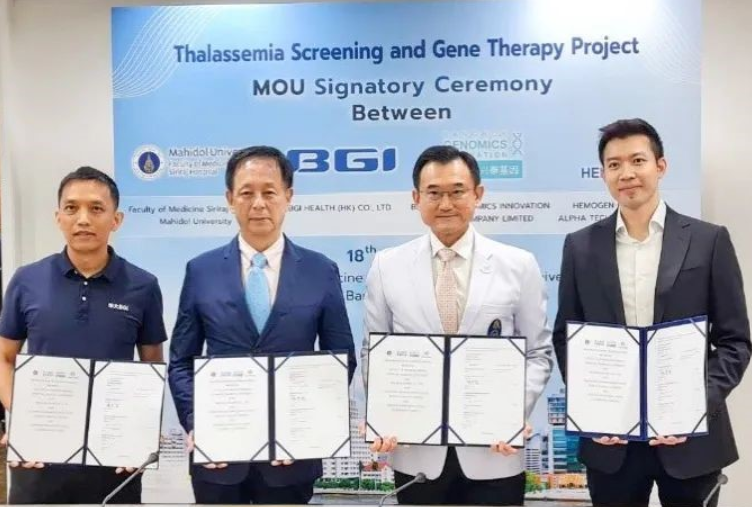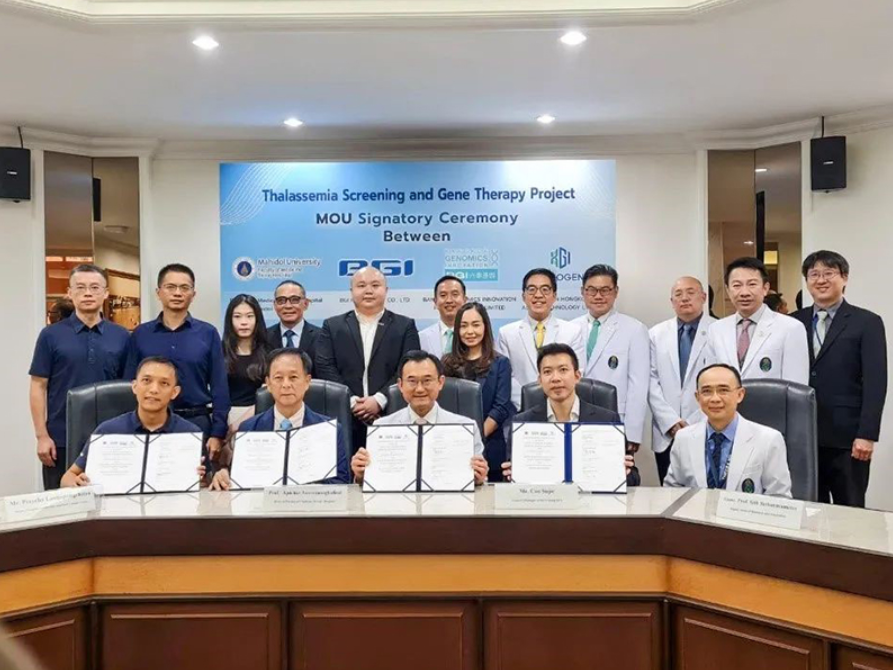Sponsored Content by BGI GenomicsReviewed by Olivia FrostAug 15 2023
On July 18th, a Memorandum of Understanding (MOU) was signed between BGI Genomics, Faculty Of Medicine Siriraj Hospital at Mahidol University, Bangkok Genomics Innovation Public Company (the BGI Genomics Thailand Joint Venture Company), and Hemogen Hong Kong Alpha Technology, Ltd.
This agreement focuses on enhancing Thalassemia prevention and treatment initiatives and facilitating collaborative efforts in cellular and gene therapy development.

Prof. Apichat Asavamongkolkul, Dean of the Faculty of Medicine Siriraj Hospital, Mahidol University (second from right), Mr. Preecha Laohapongchana, Director of BANGKOK GENOMICS INNOVATION PUBLIC COMPANY (second from left), Dr. Chao Liu, CEO of HEMOGEN HONGKONG ALPHA TECHNOLOGY., LTD (first from left) and Jeremy Cao, General Manager of BGI Genomics Southeast Asia Region (first from right) signed the Memorandum Of Understanding (MOU). Image Credit: BGI Genomics
Thailand faces a significant challenge with the prevalence of Thalassemia and sickle-cell anemia, causing hemoglobinopathies to emerge as a pressing public health issue. Statistical data reveals that 30-40% of the Thai population carries the Thalassemia gene.
The interaction of these genes leads to over 60 genotypes, exhibiting a range of clinical manifestations from asymptomatic to life-threatening. Estimates derived from gene frequencies and annual newborn counts project that roughly 1.2% of infants experience severe Thalassemia each year.
Approximately 1% of the Thai population is affected by Thalassemia, elevating it to a significant national health concern.
The Thalassemia gene testing kit, utilizing high-throughput sequencing technology, can simultaneously identify hemoglobinopathies such as Thalassemia and sickle-cell anemia.
Incorporating this technology presents a more thorough and precise approach to genetic testing in Thailand. High-throughput sequencing is poised to enhance comprehension of patient genotypes and disease susceptibility, thereby furnishing more accurate directives for Thalassemia prevention, screening, and treatment strategies.

Image Credit: BGI Genomics
Professor Apichat Asavamongkolkul, the Dean of the Faculty of Medicine at Siriraj Hospital, Mahidol University, along with fellow team members, engaged in a signing ceremony and a discussion session.
The event was also attended by Associate Professor Prapat Wanitpongpan, Deputy Dean for Corporate Communication and International Relations at Mahidol University, and Professor Dr. Vip Viprakasit from the Division of Hematology & Oncology within the Department of Pediatrics, alongside other esteemed professors.
This Memorandum of Understanding (MOU) outlines the establishment of a long-term strategic partnership among the four parties, aiming to collaborate on the prevention, screening, diagnosis, and treatment of Thalassemia. Given its high prevalence in Thailand, Thalassemia places significant strain on the national healthcare system.
This collaboration will involve a comparative analysis of the extent, efficiency, outcomes, and health economics of Thalassemia genetic screening through high-throughput sequencing-based technologies versus traditional methodologies. Additionally, joint clinical trials for Thalassemia gene therapy in Thailand will be pursued.
The four parties will also focus on fostering academic and cultural exchanges, actively promoting collaborative educational programs, contributing to the development of pertinent curricula, and offering comprehensive support for the training of both academic and non-academic personnel.
Mahidol University stands as Thailand's oldest institution for higher education, tracing its origins back to 1888 when it emerged as the Royal College of Physicians.
Renowned for its excellence in medicine, public health, and natural sciences, the university was named in honor of Prince Mahidol of Songkhla in 1969. The Prince is widely acknowledged as a pivotal figure in modern Thai medicine and public health. Mahidol University holds membership in the World Association of Universities.
For many years, BGI Genomics has shown dedication to the prevention, control, and alleviation of Thalassemia. Guided by the principle that "prevention trumps cure," BGI Genomics has harnessed cutting-edge sequencing technology to advance Thalassemia genetic screening with many governments and medical entities across various countries.
BGI Genomics has executed several thalassemia genetic screening initiatives within China. Looking ahead, the company envisions deeper collaboration with stakeholders in Thailand, with the shared goal of propelling genetic technology to serve the well-being of the Thai populace.
About BGI Genomics
BGI Genomics is the world's leading integrated solutions provider of precision medicine, now serving customers in more than 100 countries.
They provide academic institutions, pharmaceutical companies, healthcare providers, and other organizations with integrated genomic sequencing, proteomic services, clinical testing, and solutions across a broad range of applications.
They have more than 20 years of genomics experience helping customers and partners achieve their goals by delivering rapid, high-quality results using a broad array of cost-effective, cutting-edge technologies, including their own innovative DNBSEQ™ sequencing technology.
Sponsored Content Policy: News-Medical.net publishes articles and related content that may be derived from sources where we have existing commercial relationships, provided such content adds value to the core editorial ethos of News-Medical.Net which is to educate and inform site visitors interested in medical research, science, medical devices and treatments.